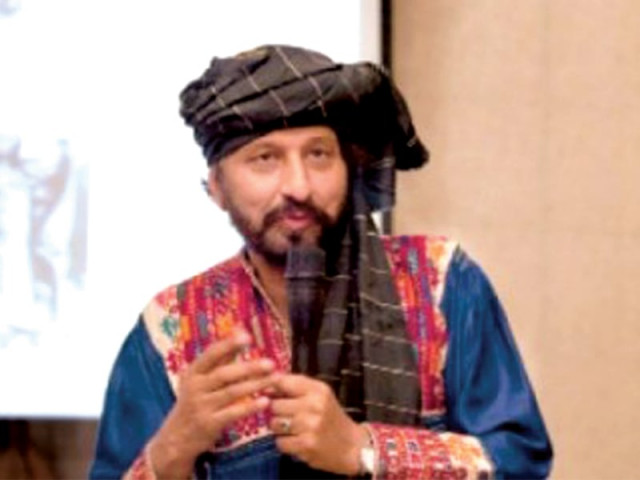Adventure enthusiast: Filmmaker’s journey into nomadic life
Abid Zareef Khan talks about his experiences with the Koochis.

Khan has examined the lifestyle and customs of the nomads closely. PHOTO: EXPRESS
On a perpetual quest for adventure, Abid Zareef Khan lets his stories do the talking. The humble and soft spoken Khan is a filmmaker rich in experiences.
While still a college student, Khan volunteered to serve in an infantry regiment in a combat area during the 1971 war in Kohat, after which he worked as a paramedic and photographer in Afghanistan, aiding the Koochi nomads’ resistance against the Soviet Union.
His globetrotting adventures continued into Peshawar, where he played a major part in helping to establish a school that caters to 500 of the city’s underprivileged children. However, Khan finds his experience of living and working with the Koochi nomads - about which he made a documentary in 2008 - the most rewarding.
His documentary titled “Treading Through Time - On the Tracks of the Koochi,” gives insight into the lifestyle and customs of the tribe as they travel and trade along their path of migration.
The Koochis are one of the largest tribes that travel between Afghanistan and Pakistan throughout the calendar year. For an outsider, living alongside the tribe let alone filming them from close quarters was considered near impossible.
The sturdy weather-beaten men of the tribe do not allow outsiders to come anywhere near their inner circle and prohibit the women from being filmed or photographed. However, because of his previous involvement with them during the Afghan War, Khan was exempted of certain restrictions.
In an era when countless nomadic tribes have dissolved and spread out over large urban and rural areas, the Koochis have managed to maintain their way of life which includes preserving decade-long traditions.

In spite of this, environmental problems appear to be forcing some Koochis to disperse from their mainland. “Although many are still part of the tribe, which is estimated to have a population of around five million, there is a heavy reliance on livestock that requires grazing lands. The diminishing environment and lack of proper grazing grounds have forced some of the Koochi to take up mainstream work to survive,” said Khan.
Throughout his time with the tribe, Khan discovered that the tribe’s ancestors can be traced back to the Khilji dynasty that ruled India hundreds of years ago - a fact not many are aware of.
A common misconception of the tribe is its apparent reluctance to cross over the border into mainstream cities, something Khan is quick to dispel.
“With the arrival of spring one can see the Koochi tribe from the motorway on the way to Kamra from Islamabad, where they will have set up tents and the women will be cutting crops for the local landowners,” he informs.

Khan recalls a foreigner’s visit to the tribe, during which a member was bluntly asked how the community felt about not having a home. “You have a home, however big it may be. It still has a boundary with a roof. For us the sky is our roof and we live under the open sky hence making everything under it our home,” the tribal member responded.
Interestingly, Khan draws a parallel between the Muslim cameleers - who journeyed from Afghanistan to Australia - and Koochi tribe members in his documentary This connection generated interest from the South Asian Australian Museum in Australia, which screens the documentary in its premises till this day.
Despite the success of this documentary and a host of other awards including a Tamgha-e-Jang and Tamgha-e-Harb for his participation in the 1971 War, Khan carries himself modestly and instead chooses to dwell on the lifetime friendships he has forged.
“I have managed to become so close to the tribe now that some of the males choose to visit or even live with me in Peshawar when they are passing by,” he said. Khan still sports the colourful embroidered traditional Koochi dress every time he is invited to present his documentary or speak of his past interactions with the tribe.
Published in The Express Tribune, April 4th, 2013.



















COMMENTS
Comments are moderated and generally will be posted if they are on-topic and not abusive.
For more information, please see our Comments FAQ